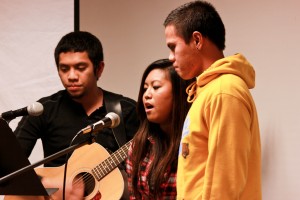Study suggests division between foreign and domestic students
by Tien Tran – Horizon Guest Writer & Kendra Burkey – Horizon Advisor
Last semester, an international student friend of mine was shocked when she accidentally saw a form indicating her roommate’s wish to move to another room. My friend felt confused and alone. What had she done to deserve this?
Admittedly, she and her roommate did not spend much time together. They rarely tried to communicate and when they did, they often didn’t understand each other. My friend confessed that her limited English ability prevented her from effectively interacting with her roommate, which then caused unexpected conflicts.
My friend’s story is not uncommon. It shows that misunderstandings between people from two different cultures can sometimes lead to conflict. However, often these conflicts could be solved through compromise and a willingness to seek understanding.
My friend isn’t alone. Many foreign students struggle to build successful friendships with their American friends, according to an article published last summer in The Chronicle of Higher Education, “Many Foreign Students are Friendless in the U.S.”
As journalist Karin Fischer reported, a recent survey conducted at 10 public universities in the US found that 38 percent of the 450 participants said that they had “no strong American friendships.” Seventeen percent said they had one friend while 18 percent claimed two friends.
So why do these divisions exist?
“Some Americans speak so fast that I cannot understand them,” said Crisentia Celine Gregor, an Indonesian student at Hesston College. “American humors and slangs are confusing to me. I do not understand it all.”
Gregor’s comment lines up with the Chronicle’s report. Not surprisingly, 46 percent of those surveyed blamed personal factors like language ability for their lack of friends. But what’s more alarming is that 54 percent said that American students are primarily responsible for the friendship gap.
Vicky Gunawan, a sophomore from Indonesia, says that sometimes these divisions happen because of cultural misconceptions.
“For some students who do not know me as much, they may think that I have a language barrier,” she said. “That makes me feel excluded.”
Although cross-cultural differences create gaps between American and foreign students in most U.S. colleges, some students do a good job trying to connect foreign and American students.
“American students are really supportive in helping me to adapt to their culture,” said Kelvin Ferbianto, an Indonesian at Hesston College.
Monica Yosin, a sophomore from Indonesia, agrees, “I have made friends who really don’t care about my language and cultural differences.”

Hesston College also provides campus jobs, academic events, CAB and mod activities. These play significant roles in enabling friendships between American and foreign students and helping us realize that, in the end, we may have more in common than we think.

